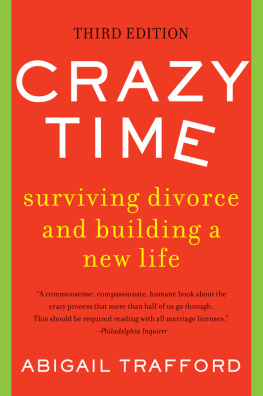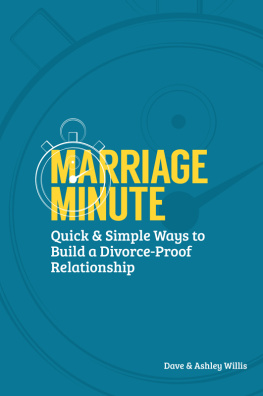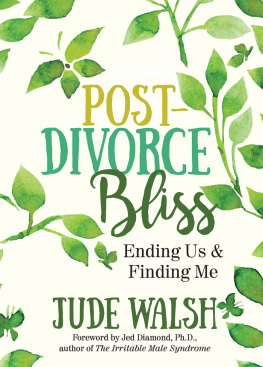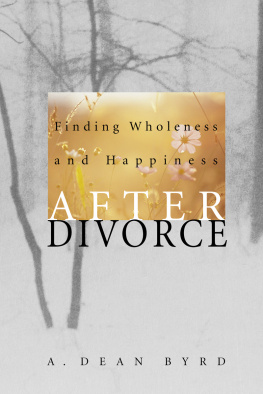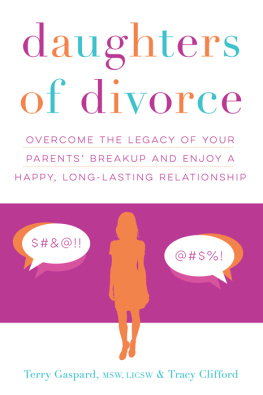First, I want to thank all of you who have written me over the years. Your words mean a lotadding details to our shared experience of divorce and affirming our resilience in the face of crisis. I just wanted to say Thanks, writes a man from Illinois in a recent e-mail. Those days really were Crazy.
I also want to thank those who helped me conceive of Crazy Time and produce the first two editions: editor Robbin Reynolds and her successor, Peternelle van Arsdale; and my agent, Carl D. Brandt. In addition, many psychologists, psychiatrists, social workers, and family counselors have given their time and insight on the subject of marriage and divorce. Some of the experts quoted in the book have moved on to different institutions or into retirement. But I have included their affiliations at the time of the interview. I have also left their quotes in the present tense because what they have to say about love and loss and love regained is timeless.
For this edition, I am grateful to agent Gail Ross and to the editors at HarperCollins, Trish Daly and Maya Ziv, for letting me update the American saga of divorce. The statistics are new; the basics of breaking up remain the same.
Most of all, my thanks go to family and friends who have stood by me over the years of living and writing Crazy Time and moving on to a new life. Some, like my parents, are deceased, but I include them because they are part of the long-evolving story of writing about love: Patricia Avery, Katrina McCormick Barnes, Candace Boyden, Annie Boyden and Perry Trafford Boyden, Lincoln and Edith Boyden, Christopher and Bunny Clark, Susanna and Moose Colloredo, Elizabeth Reynolds Colt, Ann Crittenden and John Henry, Susan Dooley, Mary D. and Thomas Byrne Edsall, Murray and Jean Gart, Mary Hadar, Caroline Herron, Eloise and Art Hodges, Mary Eliot Jackson, Janet Barnes and John Lawrence, Rebecca Lescaze and Mark Borthwick, Delia Mares, Dennis Mullin, Gertrude M. Neff, Angie Olson, Garrill Goss Page, Zipporah Raymond, Heddy F. and Thorburn Reid, Christian Robertson, Geoff Schaefer, Harvey I. Sloane, Crocker Snow Jr., June B. Spencer, Sophia Stone, Frances E. and Bayard T. Storey, Arthur and Agnes Terry, James L. and Maude Terry, Elizabeth Trafford, Perry D. and Polly Trafford, Stella M. Trafford, William Bradford Trafford, Nicholas von Hoffman, Ann Waldron, Clare Whitfield, Sherley Young. Central, of course, to the book was the support of my two daughtersAbigail Miller and Victoria Brettand my second husband, Donald L. Neff.
Finally, I want to thank the men and women who shared their stories for the book, who talked honestly and bravely about their lives, laying bare the most painful secrets. It is through these men and women that the stages of divorce take shape on the following pages. Although they remain nameless to preserve their privacy, each one has my respect and profound appreciation.
As Time Goes By: Boomerang Marriages,
Serial Spouses, Throwback Couples, and Other Romantic
Adventures in an Age of Longevity
My Time: Making the Most of the Bonus Decades After Fifty
ABIGAIL TRAFFORD is an author, journalist, and public speaker. She wrote the My Time column at the Washington Post and has been a commentator for Washington Post Radio and a syndicated columnist with Universal Press Syndicate. For fourteen years she was the Posts health editor and previously worked at U.S. News & World Report as a writer, senior editor, and assistant managing editor. She received journalism fellowships at the Harvard School of Public Health in 1982 and 2002 and was a visiting scholar at the Stanford University Center on Longevity in 2007. She lives in Boston and Vinalhaven, Maine.
ABIGAILTRAFFORD.COM
DISCOVER GREAT AUTHORS, EXCLUSIVE OFFERS, AND MORE AT HC.COM.
Australia
HarperCollins Publishers (Australia) Pty. Ltd.
Level 13, 201 Elizabeth Street
Sydney, NSW 2000, Australia
www.harpercollins.com.au
Canada
HarperCollins Canada
2 Bloor Street East - 20th Floor
Toronto, ON M4W 1A8, Canada
www.harpercollins.ca
New Zealand
HarperCollins Publishers New Zealand
Unit D1, 63 Apollo Drive
Rosedale 0632
Auckland, New Zealand
www.harpercollins.co.nz
United Kingdom
HarperCollins Publishers Ltd.
77-85 Fulham Palace Road
London, W6 8JB, UK
www.harpercollins.co.uk
United States
HarperCollins Publishers Inc.
195 Broadway
New York, NY 10007
www.harpercollins.com
Beal, Edward W., and Gloria Hochman. Adult Children of Divorce: Breaking the Cycle and Finding Fulfillment in Love, Marriage, and Family. New York: Delacorte Press, 1991.
Blumstein, Philip, and Pepper Schwartz. American Couples: Money, Work, Sex. New York: Pocket Books/Simon & Schuster, 1983.
Bretall, Robert, ed. A Kierkegaard Anthology. Princeton, NJ: Princeton University Press, 1946.
Bumpass, Larry L. Whats Happening to the Family? Interactions Between Demographic and Institutional Change. Demography , Vol. 27, No. 4, Population Association of America, 1990.
Cherlin, Andrew J. The Marriage-Go-Round: The State of Marriage and Family Today . New York: Alfred A. Knopf, 2009.
Coontz, Stephanie. Marriage, a History: How Love Conquered Marriage. New York: Penguin Books, 2006. (Originally came out from Viking in 2005.)
Fromm, Erich. The Art of Loving. New York: Harper & Row, 1956.
Gottman, John M., and Nan Silver. The Seven Principles for Making Marriage Work . New York: Crown Publishing Group, 2004.
Hetherington, E. Mavis, and John Kelly. For Better or For Worse: Divorce Reconsidered. New York: W. W. Norton, 2003.
Hochschild, Arlie, with Anne Machung. The Second Shift: Working Parents and the Revolution at Home. New York: Viking Penguin, 1989.
Jung, Karl J. Contributions to Analytical Psychology. New York: Harcourt Brace Jovanovich, 1928.
Kelly, Joan Berlin. Divorce: The Adult Perspective. Handbook of Developmental Psychology , ed. B. Wolman and G. Stricker. Englewood Cliffs, N.J.: Prentice-Hall, 1982.
Kbler-Ross, Elisabeth. On Death and Dying. New York: Macmillan, 1969.
Laing, R. D. The Politics of the Family. New York: Vintage Books/Random House, 1972.
Levinson, Daniel J. The Seasons of a Mans Life. New York: Ballantine Books, 1978.
Napier, Augustus Y. The Fragile Bond: In Search of an Equal, Intimate, and Enduring Marriage. New York: Harper & Row, 1988.
Rhys, Jean. After Leaving Mr. Mackenzie. New York: Vintage Books/Random House, 1974; Harper & Row, 1931.
Sandberg, Sheryl. Lean In: Women, Work, and the Will to Lead. New York: Alfred A. Knopf, 2013.
Satir, Virginia. Conjoint Family Therapy. Palo Alto, Calif.: Science and Behavior Books, 1967.
Scarf, Maggie. Intimate Partners: Patterns in Love and Marriage. New York: Random House, 1987.
Sheehy, Gail. Passages: Predictable Crises of Adult Life. New York: Dutton, 1976.
Slaughter, Anne-Marie. Why Women Still Cant Have It All. The Atlantic , July/August 2012.
Stevenson, Betsey, and Justin Wolfers. Marriage and Divorce: Changes and their Driving Forces. National Bureau of Economic Research, 2007.
Strean, Herbert S. The Extramarital Affair. New York: The Free Press, 1980.
Tillich, Paul. The Courage to Be. New Haven and London: Yale University Press, 1952.
Updike, John. Couples. New York: Alfred A. Knopf, 1968.
Wallerstein, Judith S., and Joan Berlin Kelly. Surviving the Breakup: How Children and Parents Cope with Divorce. New York: Basic Books, 1980.
People will ask you: I didnt know you were having trouble. What went wrong? You already know the easy answersthey were in the script of the confrontation scene. Then some of your friends say: I never liked the bitch/bastard you were married to anyway. You wonder if they know something you never knew. Then you go over the confrontation script again, refining your grievances, sharpening the battles. The main thing is to get this over with and get on with life. You roll the breakup scene around in your mind for a few nights. Your emotional editing process gets to work. You put the story through your memory a couple of times. Its finished, you think. The marriage is dead.
Next page
